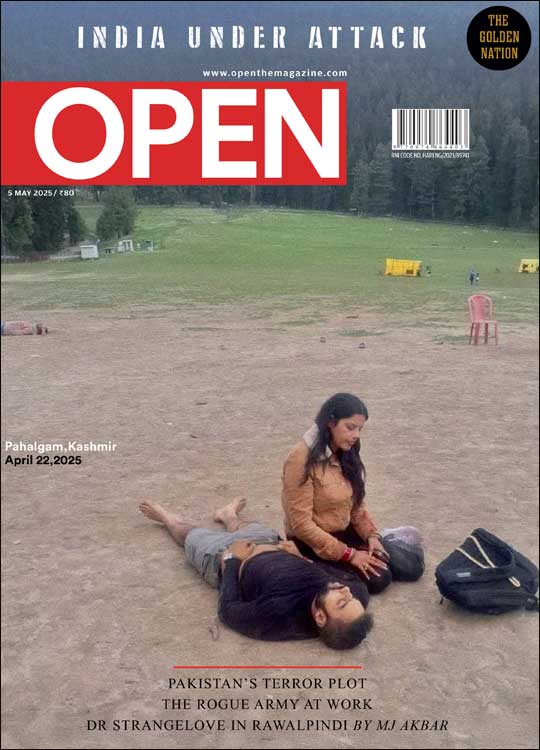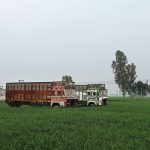Farming Death in Telangana
Where women farmer suicides are the highest
/wp-content/uploads/2017/04/Telangana1.jpg)
THE DAY SHE died, it rained torrents. A kindly neighbour, a friend of her father’s, stopped by to warn that the motor pumping water to her cotton fields was about to get submerged. But on that September morning in 2015, Sagarika was in no mood to improvise. The flux and ambiguity of being a marginal tenant farmer had been eating at her. Even rain, or for that matter, her two sons Vinnu and Vikku, five and two years old, could no longer renew her will to live. By the time 25-year-old Mada Sagarika’s parents saved the motor from flooding and returned home, it was too late to save their daughter from the poison she had gulped down—1.25 litres of monocrotophos, a powerful insecticide. She left a perspicuous note in Telugu—she had passed Class XII and had signed up for a Bachelor’s degree from an open university, hoping to graduate and apply for a government job—instructing them to use the money from the last harvest to clear some of her debts and to send the children away to an orphanage.
S Yella Reddy, 64, didn’t have the heart to follow his daughter’s wishes. His younger grandson Jagadishwar Reddy, aka Vikku, is now a temperamental three-year-old who clings to him like a lost puppy. Vikku has skipped school today, feigning stomach ache, and plays in the yard, never letting his thatha out of sight. Even now, more than a year-and-a-half later, the boys don’t sleep well at night, Reddy says. Slumped in a chair outside a bleak grey house in Nawabpet, Karimnagar district, 150 km northeast of Hyderabad, he looks weathered. This is the exact spot where, in 2009, he gave Sagarika’s hand in marriage to Mada Narayan Reddy, a young man from Kothagattu, a village 25 km away. Yella Reddy must have been wracked with guilt after her death. The groom he had picked for her turned out to be a drunk and a wastrel. When Sagarika became pregnant, the couple moved to Nawabpet and leased five acres of land at Rs 50,000 a year, hoping to start afresh. For a brief while, her father felt relief. But the crop failed, year after year, and so did the marriage. Debt mounted. At the time of her death, Sagarika owed over Rs 6 lakh—six times the average debt burden of a Telangana farmer and over a dozen times the national average—to various lenders who collected 2 per cent interest every month. “After she died and Narayan moved back to his village, money lenders have been harrassing me. Two weeks ago, one threatened to kill himself if I didn’t start paying up. I had to beg him with folded hands,” Yella Reddy says.
Reddy’s son has a job in Hyderabad that pays Rs 6,000-7,000 a month. He gets an old age pension of Rs 1,000 a month, and he and his wife tend to their 1.5 acres of maize and cotton, hoping it will be enough to see them through the year. Cotton, he says, is a capricious crop. It costs Rs 30,000-40,000 per acre to sow and to maintain. In a good year, when there is timely rain, an acre yields seven to eight quintals. This year, with cotton in limited supply, the rate has shot up to Rs 5,200-5,300 per quintal, but in 2016, he made a loss selling below Rs 4,000, he says. The odds of crop failure have gone up over the past decade, with consecutive droughts proving calamitous to farming in the semi-arid Deccan plateau. With each iteration, farmers have found themselves buried a little deeper in debt and for many, the burden eventually became insurmountable.
A stunning 89 per cent of agricultural households in Telangana are indebted, compared to the national average of 52 per cent. According to the Action Plan 2014-15 released by the state agriculture department, cotton was sown in 4.1 million acres or almost 44 per cent of land under cultivation in 2014-15—double the area a decade ago—paddy in 31.8 per cent and maize in 14.9 per cent. These minefields of BT cotton, paddy and other unsustainable crops claimed 1,358 lives in Telangana in 2015, including Sagarika’s, a number second only to Maharashtra, with 3,030 farmer suicides.
I have gone to Hyderabad several times to demand compensation from the government after my husband killed himself. I haven’t got a penny
Telangana reported the largest number of women farmer suicides in 2015: a count of 168, as against 109 in Maharashtra. Traditionally, women’s suicides have gone unreported, brushed under the carpet of marital discord. “A majority of suicides committed by women farmers were not recorded or recognised as most of them did not own land or have tenancy papers in their name and hence were not recognised as farmers,” says S Ashalatha, a Hyderabad- based researcher with the Forum For Women Farmers’ Rights (MAKAAM). “Recent reports indicate that only 6 per cent of all rural Indian households have at least one woman owning land.” Notwithstanding the gender bias in logging farmer suicides, there are reasons to believe that Telangana has become a hotbed for women farmer suicides, says Ashalatha, who has co-authored a 2015 report on women farmers in Telangana based on case studies of villages in Khammam, Nalgonda, Medak and Adilabad districts. First, women are more dependent on agriculture than men, with 57 per cent of Telangana’s agricultural labour force being female. Second, women operate more land holdings in Telangana than in the rest of the country. As per the Agriculture Census 2010-11, the share of women-operated land holdings in Telangana is 34 per cent, much higher than the national average of 12.8 per cent. This could be because of the government’s land distribution schemes and because farmers in need of additional bank loans tend to get land leased in their wives’ names so they too become eligible for debt. Third, Telangana has a higher number of women-headed households (16.6 per cent) than the national average (12.8 per cent), attributable at least in part to rampant alcoholism and widowhood. “Single women, especially young widows and abandoned women, find it difficult to get a share of the land owned by the husband. It is a case of having no rights and all the responsibility,” says Ashalatha.
THE FARM CRISIS in Telangana— even in the most suicide-prone districts where the sun beats down on concrete mini-monuments to dead farmers— isn’t as palpable as it is in Vidarbha. Lush paddy fields and golden piles of harvested corn flank the highways, at odds with the pinching poverty that one finds in the homes of farmers. If suicide is a social act, an expression of self- will in response to the collusive denial of one’s rights, then there is a deep moral significance to a woman farmer’s death. It is a reflection of the terrible opaqueness of a life spent working away in the mimetic silence of fields that invariably belong to a man. Open the door a crack and you will likely see a husband on a perpetual bender, and children who are left without a footing, like odd sounds unattached to language.
Even now, more than a year and a half after their mother died, the boys don’t sleep well at night
In the graveyard of dreams that is rural Telangana, the unmarked graves belong to the women who could never call themselves farmers. “For as long as I can remember, mother never took a day off. Father slept all day and got drunk and beat her at night, but she would be back in the fields the next morning,” says Jagyani Sravanti, 20, waif-thin and sharp-tongued. She is a tapestry of emotion as she talks about her mother Gongalla Vijaya, who set herself on fire barely three months ago after yet another failed paddy crop and died in a Warangal hospital with 38 per cent burns. Ramnagar is a small hamlet in Jangalapally gram panchayat, Jayashankar Bhupalapally district—it was part of Warangal district before the re-organisation of districts last year—and Sravanti, who got married last year, is here on her first visit after her mother’s passing. Her sister, Keerthana, 18, is a meritorious student at IIIT Basar and will soon be an engineer. “Had one of us been here, mother may have been alive today,” Sravanti says, tearing up. Fuelled by a sense of loss, she flashes her eyes at her father Gongalla Ravi as he ambles into the thatched porch of his house, groggy and slurring. Sravanti did not finish college but Keerthana was her mother’s pinhole of hope, and she seemed to be swimming towards the light. “She often talked about how Keerthana was like a son who would take care of her,” Sravanti says. But something had snapped in her, she told her daughters as she sipped on her very last drink of coconut water in her hospital bed. “I felt I could no longer carry on. The crops keep failing and there is nothing to live on.” For two decades, Vijaya had worked as a farm labourer and raised a single crop of rainfed paddy a year on Ravi’s one-acre parcel of land. Half of it was sold last year to fund Sravanti’s wedding; the remaining has just been disposed of for a sum of Rs 2.7 lakh to repay a part of the family’s total outstanding debt of Rs 4 lakh. “There is no farmer left in the family. What use is a farm?” Sravanti says. Ravi stares mutely.
“The drinking problem is getting worse. Gudumba (spurious country liquor) is brewed in plenty in the forests nearby and each year there are deaths due to drinking,” says Gongalla Lakshmi, 35, the wife of Ravi’s late brother who died from electric shock 11 years ago. Lakshmi is a farmer who barely makes ends meet by cultivating half an acre of land and working on others’ farms. “I make about Rs 20,000 a year. It is only enough because my two children go to a government school. I cannot afford to send them to college,” she says. “Vijaya was a brave, ambitious woman.”
For as long as I can remember, mother never took a day off. Father slept all day and got drunk and beat her at night, but she would be back in the fields the next morning
A woman with a dream is a cultural oddity in a society that strips her of possibilities. Pakala Mallavva, 45, was just that—an oddity. An agricultural labourer and a toddy tapper’s wife in Mogilipalem, Karimnagar district, she took a leap of faith and leased 13 acres of land at Rs 60,000 a year, starting with two acres four years ago and adding area every year. She hoped to break even some day, but as rains failed for two consecutive years, her dream turned into a sorry obsession. “It was a big mistake,” says her husband Pakala Rajamogili, 52, a timid man living in a bare house. “She sowed corn, cotton and paddy. Everything failed. We had assumed that we would do well, since even the upper caste farmers considered her a lucky hand and asked her to sow seeds for them every year,” he says. Mallavva killed herself in December 2015, leaving him with Rs 6 lakh in debts. “Both our adult sons are dependent on me. I earn just Rs 50 a day from tapping toddy. The risk we took was needless and we have paid the price,” he says.
The poor only have their hard work and their ambition to keep going, says Kankanala Vasantha Reddy, 38, an autodidact farmer from Nawabpet who never went to school. “My parents taught me to sew and to roll bidis and married me off at 18. After I came here and found we owned three acres that my husband wanted nothing to do with, I took it up,” she says, flashing a high-wattage smile. Vasantha is an activist farmer—she went organic four years ago, installed a drip irrigation system earlier this year, and consumed poison in protest in 2012 when neighbouring farmers filled up a hillside trough that was keeping her farm safe from flooding. “As a woman, you need to stand up and paddle against the current. Only then can you get things done,” she says. Her husband Sadashiva Reddy, a chronic idler, could care less, but her children, a daughter who is a first- year student of B Pharm, and 17-year-old son Saikrishna, are proof that people can be more than the sum of their problems. Saikrishna is an enterprising boy who acquired Jio SIM cards for the entire village soon after the network was launched. He helps out in the farm after school and says, with a shy smile, that he wants to be a politician. “I have been farming for 15 years now. There were years when we lost money, and I have yet to pay back Rs 2 lakh of debts, but I know what I have to work towards,” says his mother, making tea in a kitchen fragrant with onion shoots. “I want my son to be an IAS officer who works for farmers’ welfare. They need all the help they can get.”
The Telangana government is yet to grant the relief package of Rs 6 lakh—it used to be Rs 1.5 lakh in united Andhra— to the families of the 168 women who perished in 2015, says Beeram Ramulu, an activist and field worker with the Rythu Swarajya Vedike (RSV), a farmers’ welfare organisation. “Not a single family has received compensation,” he claims. Not that the government is sympathetic to families of male suicide victims. According to statistics available with the RSV, of the 2,750 total suicides since bifurcation, the Telangana government has identified only 652 as farmer suicides and awarded the families compensation. Only half of these, however, have received the full Rs 6 lakh, as others had to contend with the Rs 1.5 lakh fixed by the Andhra Pradesh government in 2004. This means over 2,000 widowed women in Telangana are on the verge of defeat, burdened with outstanding loans and the responsibility of raising their children. Other steps taken by Chief Minister K Chandrashekhar Rao to secure the future of small and marginal women farmers, such as a scheme to provide three acres of land to every landless Dalit woman, have had limited success in pockets. “There is a growing number of women- led, especially widow-led, families that need government support beyond Rs 1,000 of pension,” says Ashalatha.
IN IPPAGUDA, A viIlage near Station Ghanpur in Jangaon district, Godishala Bhagya, 35, says she has starved many a day in the past few years and even begged neighbours for hand-me-down clothes for her children. Her husband Bhikshapathi—in pictures he looks like a Tollywood hero out to save a damsel in distress— killed himself six years ago, leaving her 2.5 acres and Rs 4 lakh in loans. “I was left alone to look out for our two daughters and son and my old mother-in-law,” she says. Her elder daughter Uma, who was married in 2015, delivered a baby boy 13 days ago, and she has had to spend Rs 50 a day on her care since—it is money she does not have. Her cotton crop was washed away in the rain, the maize never flowered, the paddy yielded just eight bags, and the tomatoes she had spent Rs 5,500 sowing and caring for fetched such low prices in the market—Rs 60 for four large crates— that she may never again sow vegetables.
Bhagya is a paradoxical name for someone who has not seen a penny of her relief package. “I have gone to Hyderabad several times to protest. I have shared my story on stage and yet, the government does not listen,” she says. She has sold three of her five cows, but her son, in class 11, and daughter, a year younger, won’t let go of the remaining two. They work on Sundays to supplement the income from the farm, and they have pleaded with her never to sell the land, she says, sweeping her front yard and garden as the sun hangs low in the sky.
The village is in a chatty mood. Women saunter in to play with Uma’s son who doesn’t yet have a name. A neighbour vigorously combs her daughter’s hair with Parachute oil on Bhagya’s porch and Bhagya mooches a handful, happily rubbing it into her sun-baked head. Across the street, little girls with neatly parted hair sing old Telugu film songs for our benefit. The domestic setting is perhaps Bhagya’s only solace after a hard day’s work. “I will put the children through college, come what may,” she assures us, waving goodbye.
Women in rural Telangana continue to be forced to marry while still in their teens, flung like skipping stones into the sea of life only to see how far they would go. Nagu Mamata, the youngest of five daughters, married a farmer from Abbapur in Jayashankar Bhupalapally district at 16 years of age, had two children and was widowed at 23. Seven years later, her calloused hands and the dusty shirt worn on top of her sari make it impossible to determine her age. Mamata is plucking chillies from a neighbour’s field in exchange for his help in ploughing her 1.5 acres of land. She sowed chilli last July thinking cotton was a bigger risk, but the harvest has amounted to just a heap, visible several metres away. “I spent Rs 60,000 on the crop and if the price is good, I may sell it for Rs 25,000. The borewell dried up during Sankranti and I could not do anything,” she says. Since her husband died of an illness, Mamata has been the sole breadwinner in the family. “I had to pull my son Nagarjuna out of private school and he cried for days. He hated going to a government school,” she says, resting up under a tamarind tree not far from her freshly-tilled land. “Even though I work on others’ fields besides my own for Rs 200 a day, it is never enough. Another pair of hands would have made a difference.” Life has passed her by, and in her spare moments, she imagines a comfortable counterlife for herself as a character in a Maa TV soap. In real life, meanwhile, like Mamata’s yield, the livelihoods of women farmers in Telangana continue to shrink rapidly with each failed crop, shattering the illusion that they have any agency over their own lives.

/wp-content/uploads/2025/04/ToC-Cover-Pahalgam.jpg)















More Columns
Hindu lives too matter: US spy chief Tulsi Gabbard Open
The Line Must Move Shubhrastha
Khadi sector scaling new heights even as FMCG giants incur losses Open